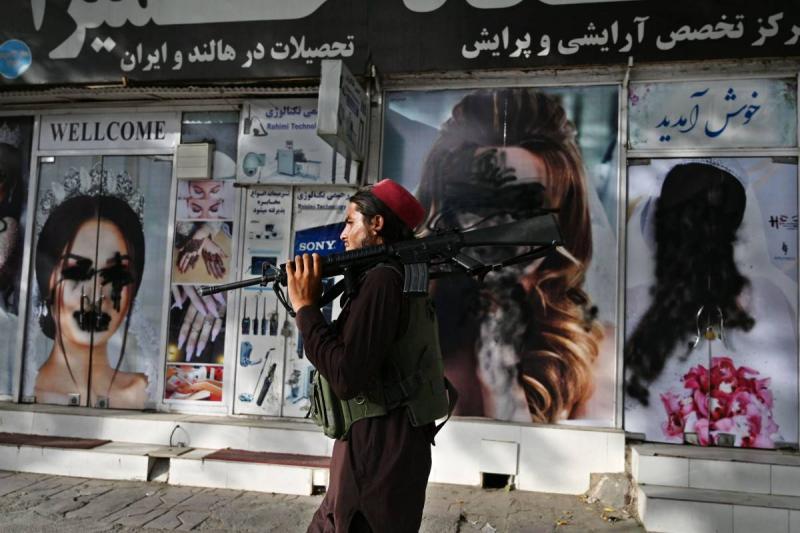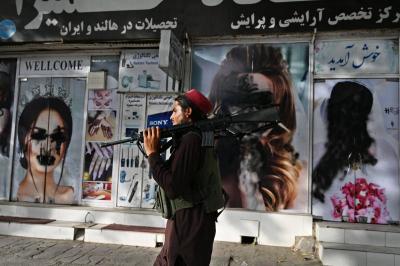Under the title "After the Major Failure... How Can America Compensate for the 'Disaster' in Afghanistan?", Bloomberg Al-Sharq reported that U.S. President Joe Biden's defense of the withdrawal from Afghanistan was characterized as "harsh, selfish, and entirely unconvincing." Above all, the defense was out of context. The question is no longer whether U.S. troops should remain, but how the United States can mitigate the harm caused by this severely failed exit.
Some of the gloating among U.S. adversaries is exaggerated, but there is no doubt that America’s credibility has suffered a fatal blow. Abandoning loyal Afghan allies to face their fate alone will haunt future American interventions around the globe. As friends are ignored, competing powers are rallying their courage. Terrorist groups that have always been hard to target from afar are now larger and faster than ever before. Recovery from this disaster will require a long and arduous effort.
The effort to recover from the disaster must start with telling the truth. So far, the president has refused to acknowledge this venture as a failure. In the event of chaos, it is difficult to know what might happen. Biden must be honest and not stubborn in his defense.
Next, securing the evacuation of Americans and their allies is crucial; the United States must do everything possible to ensure the safe passage of Afghans eligible for U.S. visas to Kabul airport – and continue airlift operations until they can leave.
Evacuations should not only include Afghans who worked directly with the U.S. military, but also those associated with media and U.S.-based relief organizations, who are officially supposed to apply for visas from a third country. A new humanitarian program for conditional amnesty is needed, similar to what was done for South Vietnamese and Cubans, so that they and other vulnerable Afghans can be directly transported to Guam or the U.S. mainland for resettlement. The United States must also lead global efforts to avoid a more widespread refugee crisis.
Neighboring countries like Iran and Pakistan – which already host millions of Afghan refugees – are closing their borders to further influx, while European governments are warning asylum seekers against attempting to reach the West. Here, the U.S. must set an example, committing to take its fair share of any outflow of refugees. The U.S. must also rally donors to fill the funding gap for UN refugees.
Washington should leverage next week's G7 talks to advance a broader resettlement plan for Afghans, similar to what was developed to accommodate Chinese Indian refugees after the Vietnam War. The remaining Afghans will also need assistance. Even before the Taliban seized power, Afghanistan faced a worsening humanitarian crisis, with nearly half the population in need and over 550,000 Afghans forcibly displaced since the beginning of 2021 alone.
In addition to ensuring the UN and relief organizations have the resources they need, the U.S. must work with its partners on the Security Council to ensure the Taliban allows aid to flow freely. Subsequently, the U.S. must deal with what could potentially be a significant terrorist threat under Taliban rule. Intelligence agencies need to reallocate resources and intensify surveillance to track any increase in jihadist numbers in the country, while enhancing communication with former CIA operatives and Afghan special forces who may provide valuable support.
Regional powers like Pakistan, Russia, and China do not share the same goals as Washington, but all fear a return to extremism, and regional countries should be urged to coordinate pressure on the Taliban to rein in the most dangerous groups.
Finally, the Biden administration must launch a comprehensive effort to rebuild trust with allies and partners. The president's failure to engage with allies immediately after the fall of Kabul is inexcusable. To set things right, there are no shortcuts; it will take more than delivering good speeches and holding democracy summits.
The U.S. can help India deal with the renewed terrorism threat. For example, the U.S. had previously anticipated that allies in the Quadrilateral Security Dialogue, also known as "Quad" (the U.S., Japan, Australia, and India), and NATO would support its strategic priorities in the region, but Washington will now need to listen more attentively to their concerns.
The U.S. must strive to eliminate unnecessary trade disputes with Europe and seriously engage in trade talks with Asian countries, so that they see clear benefits in a closer relationship with the United States. At the very least, if competitors test the country's resolve, as the Soviets did after the fall of Saigon, the U.S. will have to respond quickly and intelligently. Recovery from this setback will require time, effort, resources, and close, coordinated cooperation with allies moving forward.




